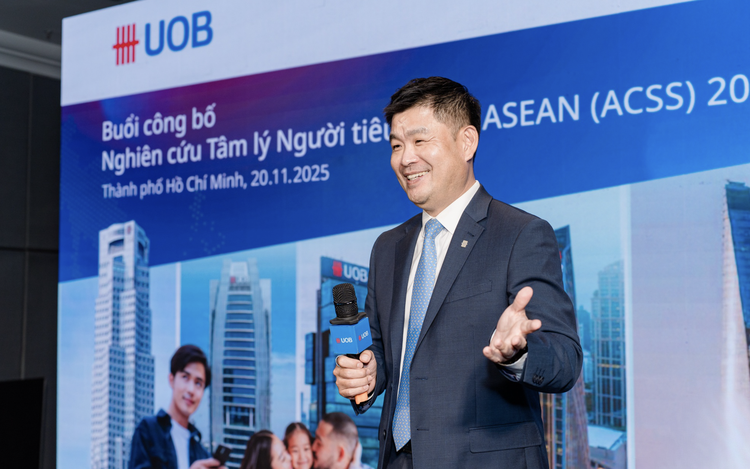
Paul Kim, head of personal financial services at UOB Vietnam, speaks at a ceremony to release the 2025 ASEAN Consumer Sentiment Study in Ho Chi Minh City, November 20, 2025. Photo: A. H. / Tuoi Tre
The study indicated strong financial resilience among the Vietnamese respondents, with 86 percent feeling secure with their emergency funds,
Some 79 percent of the Vietnamese respondents are confident in handling current debt, while 82 percent report having adequate insurance coverage.
Besides, 76 percent of these customers believe their current investments are sufficient to support long-term goals and retirement plans.
Savings behavior remains notably stable.
Eight in 10 Vietnamese consumers say they save more than 10 percent of their monthly income, with women standing out as the most disciplined savers.
Additionally, 57 percent report having accumulated enough savings to cover three to six months of expenses.
While many Vietnamese consumers are actively improving their financial knowledge, fewer translate that knowledge into investment action.
Fixed deposits remain the most popular investment choice, favored by 93 percent of the respondents, reflecting a growing preference for caution amid economic uncertainties.
Gen Z: Confident but underprepared
The study identifies Gen Z (born from around 1997 to 2012) as the least financially prepared group.
About five percent have no emergency savings or insurance, and fewer than half (47 percent) have enough savings to cover more than three months of expenses.
Only 33 percent hold personal health insurance and 43 percent have life insurance.
Notably, 13 percent feel completely unprepared to manage existing debt.
This gap in financial readiness correlates with lifestyle-driven spending habits.
A striking 77 percent of the Gen Z respondents in Vietnam say they prefer to enjoy life now rather than worry about the future.
The same proportion believe social pressure and peer expectations make saving more difficult, higher than in any other age group.
Strong optimism amid robust economic growth
The ASEAN Consumer Sentiment Index was built on six components assessing perceptions of current and future economic conditions and personal financial well-being.
In Vietnam, more than eight in 10 respondents express optimism about the overall economy.
This positive sentiment is underpinned by strong macroeconomic results in the first half of 2025, including GDP growth of 7.52 percent year on year, the highest first-half growth rate since 2011.
Following an impressive third-quarter performance of 8.23 percent, UOB recently revised Vietnam’s full-year GDP growth forecast upward from 7.5 percent to 7.7 percent.
Confidence in the economic environment has translated into optimism at the household level.
Over 70 percent of Vietnamese consumers expect their personal financial situation to improve next year.
Concern about rising living costs has eased to 50 percent, with an even sharper decline among Gen Z respondents.
Still, stability of income and long-term financial commitments remain top priorities, particularly for Gen Y, a term popularly referring to people born between the early 1980s to the mid-1990s and early 2000s.


Max: 1500 characters
There are no comments yet. Be the first to comment.